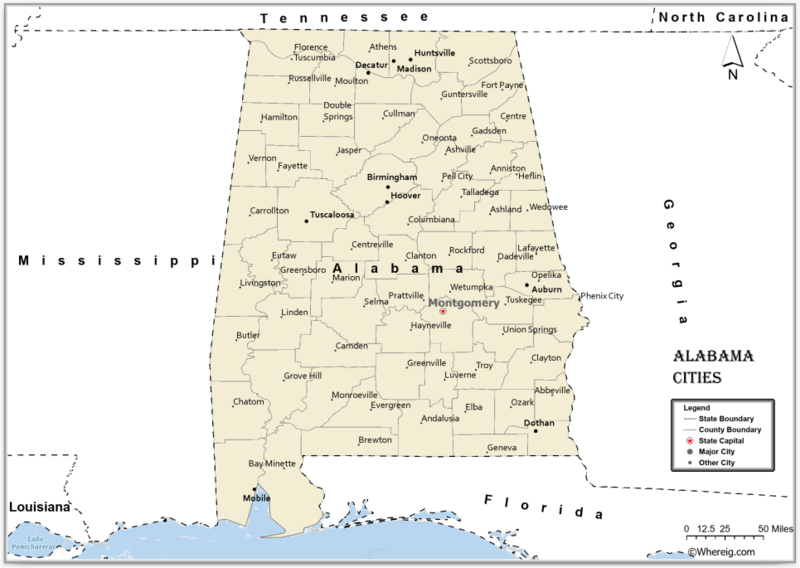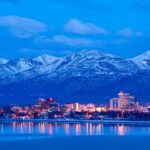
Alabama, known for its rich cultural heritage and significant historical landmarks, is also home to a diverse array of cities varying in size and population. This article delves into the most populous cities in Alabama, offering a detailed examination of their demographics, growth trends, and the unique features that set each city apart. Whether you’re considering relocation, a visit, or simply wish to learn more about the Heart of Dixie, join us on a journey through Alabama’s urban centers.
Top 10 Most Populous Cities in Alabama
Alabama’s cities showcase a wide range of sizes and populations, reflecting the state’s varied landscape from coastal towns to industrial hubs. Here are the top 10 most populous cities as of the latest census data:
- Birmingham;
- Montgomery;
- Mobile;
- Huntsville;
- Tuscaloosa;
- Hoover;
- Dothan;
- Auburn;
- Decatur;
- Madison.
Each city holds its unique charm and contributes significantly to Alabama’s economy and cultural heritage. In the sections that follow, we’ll explore the unique features and attractions that make these cities stand out.
Unique Features and Attractions in Each City
- Huntsville: Known as “Rocket City” for its pivotal role in U.S. space missions, Huntsville is home to the U.S. Space & Rocket Center, offering interactive exhibits and space artifacts. The city is also renowned for its technology sector and research parks;
- Tuscaloosa: Home to the University of Alabama, Tuscaloosa boasts a lively college town atmosphere with a strong emphasis on sports, particularly football. The city’s riverfront offers scenic beauty and recreational activities;
- Hoover: A suburban gem, Hoover is known for the Riverchase Galleria, one of the largest shopping centers in the Southeast. The city also offers beautiful parks and recreational areas, including the Aldridge Gardens;
- Dothan: Celebrated as the “Peanut Capital of the World,” Dothan hosts the National Peanut Festival annually. The city is also home to a variety of murals that depict its agricultural heritage and cultural history;
- Auburn: As the other major college town in Alabama, Auburn is home to Auburn University and offers a vibrant cultural scene with a focus on education and sports. The city is also known for its lovely downtown area and the Jule Collins Smith Museum of Fine Art;
- Decatur: Situated along the Tennessee River, Decatur offers a mix of industrial heritage and natural beauty. The city is known for the Point Mallard Park, which features a water park, golf course, and ice-skating complex;
- Madison: A rapidly growing city, Madison is known for its high-quality schools, community spirit, and proximity to Huntsville’s technological and aerospace industries. The city offers a range of parks and recreational facilities.
Comparative Table: Unique City Attractions
| City | Key Attraction | Cultural Events | Outdoor Recreation |
|---|---|---|---|
| Birmingham | Civil Rights Institute | Jazz Festival | Red Mountain Park |
| Montgomery | State Capitol | Alabama Shakespeare Fest | Riverfront Park |
| Mobile | USS Alabama | Mardi Gras Celebrations | GulfQuest |
| Huntsville | U.S. Space & Rocket Center | Panoply Arts Festival | Monte Sano State Park |
| Tuscaloosa | Bryant-Denny Stadium | Druid City Music Fest | Black Warrior River |
| Hoover | Riverchase Galleria | Hoover Hayride | Moss Rock Preserve |
| Dothan | National Peanut Festival | Murals of the Wiregrass | Landmark Park |
| Auburn | Auburn University | A-Day Game | Chewacla State Park |
| Decatur | Point Mallard Park | Riverfest | Wheeler Wildlife Refuge |
| Madison | Historic Downtown | Madison Street Festival | Rainbow Mountain Trail |
Graphical Representations

The first graph, “Population Growth vs. Cultural Events in Alabama Cities,” illustrates the correlation between the population growth percentage over the past decade and the number of major cultural events hosted by each city. This line graph reveals how cultural vibrancy potentially correlates with urban growth, showcasing that cities like Huntsville and Mobile, with higher population growth rates, also hosted a greater number of cultural events, suggesting a vibrant cultural scene may be an attractor or result of population growth.

The second graph, “Outdoor Recreation Index by City in Alabama,” ranks each city based on a hypothetical index that considers the number and diversity of outdoor recreational activities available, such as parks, rivers, and sports facilities. The bar chart indicates that Huntsville and Mobile are leaders in offering outdoor recreational opportunities, emphasizing their focus on enhancing quality of life through outdoor activities.
Alabama’s Urban Gems: A Deep Dive into Cities by Population
Alabama’s cities are as diverse as they are vibrant, each boasting unique features, attractions, and opportunities that contribute to the state’s rich cultural tapestry and quality of life. From the historic streets of Birmingham to the technological hub of Huntsville, this comprehensive exploration reveals the distinct character and appeal of Alabama’s most populous cities.
For those interested in further exploration or seeking more detailed information about each city, government websites offer a wealth of resources, including demographic data, economic reports, and cultural event calendars. Below are links to the official government websites for each of the top cities discussed:
- Birmingham: Birmingham City Government;
- Montgomery: City of Montgomery Government;
- Mobile: City of Mobile Government;
- Huntsville: City of Huntsville Government;
- Tuscaloosa: City of Tuscaloosa Government.
These official city websites provide a gateway to understanding the nuances of each city, from historical landmarks and local government initiatives to community events and outdoor recreation programs. By exploring these resources, residents and visitors alike can gain deeper insights into what makes each of Alabama’s populous cities a unique place to live, work, and play.
Conclusion
In conclusion, our exploration into the most populous cities of Alabama unveils a rich tapestry of cultural vibrancy, outdoor allure, and dynamic growth patterns. From the bustling streets of Birmingham, resonating with historical significance and culinary excellence, to the technological hub of Huntsville, where innovation meets recreation, Alabama’s cities offer a unique blend of experiences. Montgomery’s storied past, Mobile’s maritime charm, and Tuscaloosa’s collegiate spirit further enrich this diverse landscape.
The comparative analysis, underscored by graphical representations of population growth versus cultural events and the Outdoor Recreation Index, highlights the intricate relationship between a city’s growth trajectory and its cultural and recreational offerings. These cities not only serve as economic engines and cultural custodians but also stand as testaments to Alabama’s commitment to enhancing quality of life through sustained urban development and community engagement.
As Alabama’s cities continue to evolve, they remain anchored by their unique attributes—each city contributing its distinct flavor to the state’s collective identity. The challenges of urban growth, while present, are met with innovative solutions and a forward-looking vision, ensuring that Alabama’s urban centers thrive as places of opportunity, culture, and outdoor enjoyment.
Last modified: February 28, 2024
